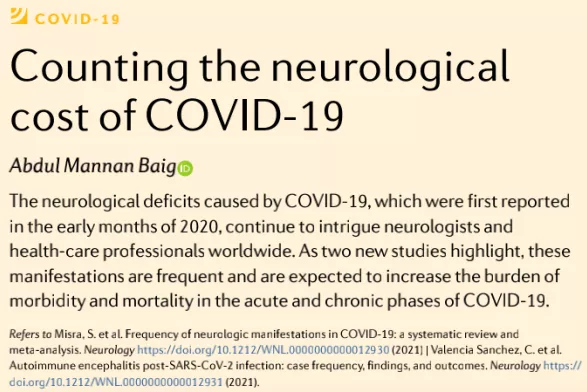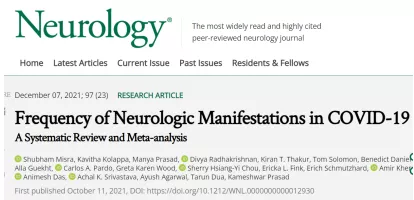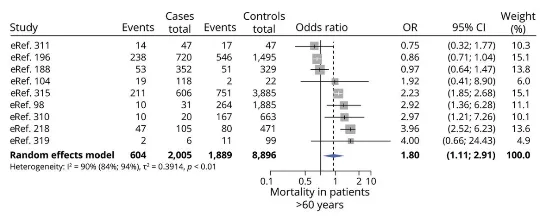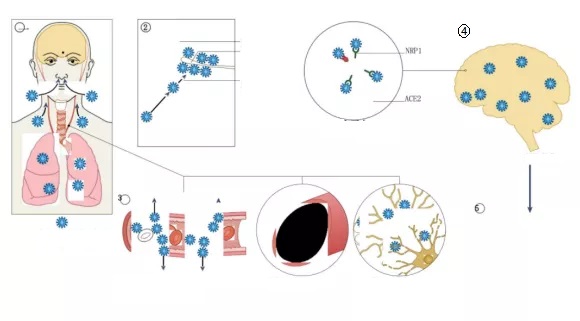COVID-19 virus may attacks the central nervous system even patients recovered
- Why Botulinum Toxin Reigns as One of the Deadliest Poisons?
- FDA Approves Pfizer’s One-Time Gene Therapy for Hemophilia B: $3.5 Million per Dose
- Aspirin: Study Finds Greater Benefits for These Colorectal Cancer Patients
- Cancer Can Occur Without Genetic Mutations?
- Statins Lower Blood Lipids: How Long is a Course?
- Warning: Smartwatch Blood Sugar Measurement Deemed Dangerous
COVID-19 virus may attacks the central nervous system even patients recovered
- Red Yeast Rice Scare Grips Japan: Over 114 Hospitalized and 5 Deaths
- Long COVID Brain Fog: Blood-Brain Barrier Damage and Persistent Inflammation
- FDA has mandated a top-level black box warning for all marketed CAR-T therapies
- Can people with high blood pressure eat peanuts?
- What is the difference between dopamine and dobutamine?
- How long can the patient live after heart stent surgery?
COVID-19 virus may attacks the central nervous system even patients recovered.
The super destructive power of the COVID-19 virus: it can still come back after recovery and attack the central nervous system.
These two days, a team of researchers from the US NIH through the autopsy report of the deceased find COVID-19 pneumonia: COVID-19 virus was “cunning” much more can be detected in human tissues, including brain tissue than we imagine, in addition to their super Staying in the body for a long time, even if the patient has no symptoms, there will be a “resurgence” .
Coincidentally, “Nature” magazine also published a related review, and found that the destructive power of the new coronavirus is not limited to the respiratory tract, and the degree of damage to the organs is not related to the degree of symptoms.
People with mild infections even if they have not been in the ICU After recovering and being discharged from the hospital, it is possible to return to the hospital or even die a few months later.
At present, the number of patients with COVID-19s in the world has been rising repeatedly. Even if the existing medical conditions can barely save their lives, it is difficult to protect them from sequelae.
In the post-epidemic era and in the future, there will only be more and more COVID-19 patients, and it is often difficult for the survivors to return to a normal life.
The reported COVID-19 virus has ruined the careers of many sports stars. The sequelae and complications will accompany them for the rest of their lives.
They will miss a healthy life, even lose their job and self-care ability, and find it difficult to reintegrate into society.
Some medical experts commented: The currently popular “Omicron strain is extremely contagious and the number of people infected is large.
If the Omicron strain can replicate in multiple organs in the body for a long time, then the number of deaths from other organs/systems will greatly increase.”
As early as 2020, it has been reported that the new coronavirus can cause neurological deficits, which has attracted the attention of neurologists and health care workers all over the world.
Recently, Shubham Misra and other scholars published a review in this regard: analyzing a piece of data, describing the occurrence of neurological symptoms that are damaged by COVID-19 pneumonia, and discussing the neurological symptoms and the rate of severe illness in patients with COVID-19 pneumonia. Mortality relationship.

This data comes from 55 countries. After analysis, researchers have identified 41 neurological symptoms that may occur in the course of the new coronavirus.
It is estimated that as many as one-third of patients exhibit at least one of these 41 symptoms, and that one-third of patients have a mortality rate of 27%.
At the beginning of 2020, the new coronavirus is considered to be a potential neurotropic virus, and has a high possibility of entering the brain through the olfactory mucosa and mucosa. In addition, the researchers also found:
1. Patients of different ages have different chances of neurological disease caused by the COVID-19. Specifically, the mortality rate of patients over 60 years old is particularly high, and the common symptoms are acute confusion, delirium, fatigue, and myalgia;
2. The common symptoms of patients under the age of 18 are: smell or taste disorders, headaches, and seizures in some people.
3. Moreover, the probability of stroke caused by COVID-19 pneumonia is six times that of influenza, which is 1.2%.
 This study investigated the correlation between the neurological symptoms caused by the COVID-19 and the severity of the disease and mortality.
This study investigated the correlation between the neurological symptoms caused by the COVID-19 and the severity of the disease and mortality.
 Forest plot describing the relationship between neurological manifestations and mortality in patients with COVID-19 ≥ 60 years of age
Forest plot describing the relationship between neurological manifestations and mortality in patients with COVID-19 ≥ 60 years of age
The researchers also surveyed 556 consecutive patients and assessed the antibody levels in their serum samples as part of the diagnostic evaluation for autoimmune encephalitis. The results are as follows:
1. Eighteen patients (3%) who underwent a neuroantibody test tested positive for anti-COVID-19 antibodies.
2. Among those recovering from the COVID-19, the autoimmune encephalitis only accounts for 0.05% of the relevant confirmed patients, but in this 0.05% there will be epileptic seizures, mood disorders, delirium, gait ataxia, abnormal brain MRI, etc. symptom.
Subsequent studies reported on the potential pathways for the virus to sneak into the central nervous system. As shown in the figure, the virus first produces a viral load in the mouth and nose, causing infection of the olfactory mucosa and olfactory bulb to reach the brain.
 This picture illustrates how the new coronavirus spreads to the brain (nasal cavity-olfactory plate-olfactory bulb) and how it damages neurons
This picture illustrates how the new coronavirus spreads to the brain (nasal cavity-olfactory plate-olfactory bulb) and how it damages neurons
As the virus buds in frontal neurons have been confirmed, the process of central nervous system damage has gradually become clear:
1. The olfactory mucosa in the nose lacks a lymphatic aggregation gate, through which the new coronavirus enters the central nervous system.
2. In this process, traces of viral RNA and virus particles may be left in these locations .
3. In addition, factors such as hypoxia, cerebral ischemia and cytokine storm may work together with the neurotrophic effect of the new coronavirus to destroy the nervous system.
4. After finding the mechanism of the nerve center infection, the researchers plan to use antiviral drugs and antibodies for local treatment through nebulizers and nasal sprays, which is expected to reduce the viral load and minimize the incidence of neurological complications.
More evidence about the sequelae of the nervous system has emerged, which has also aroused more attention and worries: it calls for changes in diagnostic methods and management models, rehabilitation evaluation standards, and treatment methods.
This is because these patients with COVID-19 neurological symptoms may be permanently weakened due to damage to their body functions.
The future expansion of this part of the group is an inevitable trend, which will undoubtedly cause a huge blow to a country’s health care system and population quality.
Especially under the raging Omicron strain, the spread of the new coronavirus has greatly increased, and we still know very little about it. Perhaps the mild disease it causes is just an illusion.
COVID-19 virus may attacks the central nervous system even patients recovered
(source:internet, reference only)
Disclaimer of medicaltrend.org
Important Note: The information provided is for informational purposes only and should not be considered as medical advice.



